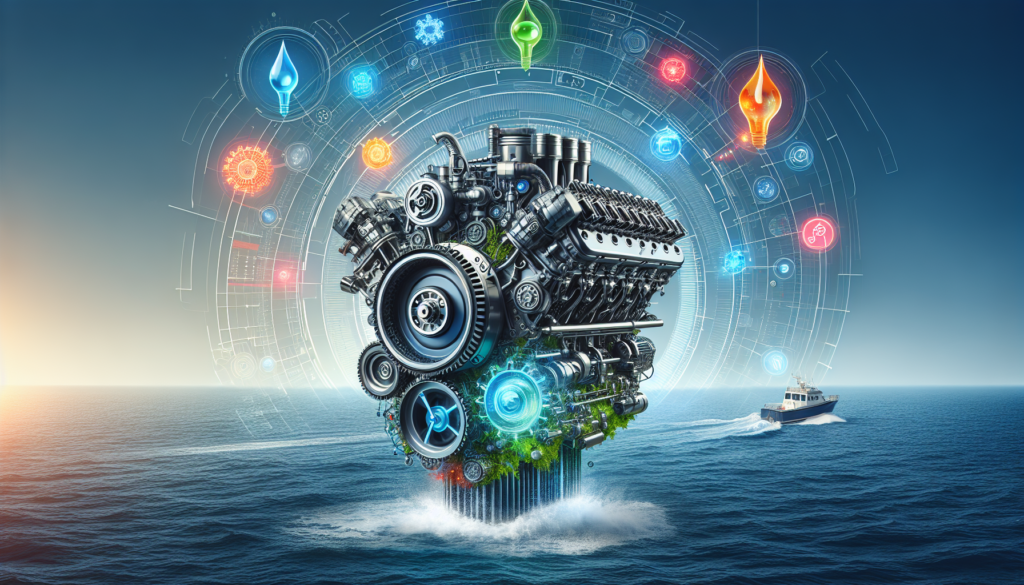Whether you’re a seasoned sailor or a weekend boater, optimizing your boat’s engine performance is key to a successful voyage. The article, “The Best Fuel Additives For Improving Boat Engine Performance” provides a comprehensive list of top-flight fuel additives that can significantly enhance your boat’s engine efficiency. It expertly breaks down the advantages of each additive, helping you understand how they can boost your engine’s power, improve fuel economy, and extend the life of your boat. So buckle up, your journey towards optimal boat engine performance starts here!

Understanding Fuel Additives
Imagine you’re on your boat, all geared up for that exciting weekend fishing trip, but your engine decides to act up. Maybe it lacks power, or it takes an ungodly amount of time to start. In such instances, you might want to consider fuel additives.
What are Fuel Additives
Fuel additives are special chemical compounds that you add to your boat’s fuel. Their role is to enhance the overall performance and efficiency of the engine. These compounds clean your engine, prevent corrosion, and stabilize fuel during off-season storage. They accomplish this by promoting cleaner combustion, easing engine starting and idle, and combating issues like gum and varnish build-up, carbon deposits, and water contamination.
Significance of Fuel Additives in Boat Engines
For boat engines, fuel additives can work magic. They play a crucial role in optimizing engine performance, promoting its longevity, and reducing maintenance costs. They are especially important for boats because boat fuels often sit for long periods and can degrade or result in condensation, which can lead to a myriad of engine problems.
Types of Fuel Additives
Fuel additives aren’t a one-size-fits-all solution. They come in different types, each designed to address specific issues. Some common ones include fuel stabilizers, anti-gel additives, cetane boosters, anti-corrosion additives, and fuel system cleaners. It’s important to understand the specific needs of your boat engine to choose the right kind of fuel additive.
The Relationship Between Fuel Additives and Engine Performance
So, how exactly do these additional compounds affect your engine’s performance? And can they really make a difference?
Impact of Fuel Additives on Engine Efficiency
Fuel additives’ proper usage can have a positive impact on engine efficiency. They promote better combustion, which means your engine burns fuel more efficiently. This leads to increased power output and smoother engine operation. Moreover, they clear up deposits and prevent them from forming in the first place, thus maintaining the engine’s peak performance.
How Fuel Additives Protect Boat Engine
Beyond enhancing performance, fuel additives also protect your boat’s engine. By eliminating accumulated gunk and deterring the build-up of new deposits, these compounds protect the engine’s internals, extend its life, and reduce the need for heavy-duty repairs. They also help prevent the ill effects of water in the fuel system, a common problem in boats.
How Additives Improve Fuel Consumption
Here’s the deal with fuel additives: they make your engine happy. And a happy engine performs well without guzzling down tons of fuel. Fuel additives can improve fuel consumption by ensuring cleaner combustion and reducing friction within the engine system. This means your boat can go further with less fuel, which, undoubtedly, is a good thing for your pocket.
Top Fuel Additives for Gasoline-Powered Boat Engines
Plenty of fuel additives promise to improve your boat’s engine performance. Here are some that have proven their worth.
Sta-Bil Marine Formula
Sta-Bil Marine, designed specifically for marine applications, is a popular fuel additive. This formula offers protection against the negative effects of ethanol-blended fuel and helps to clean the fuel system, removing unwanted deposits.
Lucas Oil Products Inc. Deep Clean Fuel System Cleaner
The Lucas Oil Deep Clean Fuel System Cleaner is designed to deeply penetrate and clean the entire fuel system from varnishes and other harmful deposits. It can make notable improvements in performance and fuel economy.
Gumout Regane Complete Marine Fuel System Cleaner
Gumout Regane Fuel System Cleaner targets the entire fuel system, cleaning away carbon deposits and preventing future build-up. It’s especially effective for high-power, high-performance marine engines that demand optimal operation.
Top Fuel Additives for Diesel-Powered Boat Engines
Boat owners with diesel engines also have a wide selection of fuel additives to choose from.
Biobor JF Diesel Biocide
This powerful dual-phase biocide both kills and prevents microbial growth in diesel fuel, a common issue for boats. It’s ideal for long-term storage and maintaining fuel integrity.
Star Brite Star Tron Diesel Additive
Star Brite’s Star Tron Diesel Additive promotes increased power and fuel economy and reduces soot. It is also formulated to stabilize fuel chemistry during off-season storage.
Power Service Diesel Kleen +Cetane Boost
Power Service Diesel Kleen +Cetane Boost is specifically formulated to clean fuel injectors, improve fuel injection and combustion efficiency, and increase horsepower. It’s a handy tool for engine performance enhancement.

How to Use Fuel Additives in Boat Engines
Adding fuel additives isn’t just about pouring liquid into the tank, there are things to consider to guarantee its effectiveness.
Choosing the Right Fuel Additive for your Boat
The first step is choosing the right fuel additive for your needs. Research, read reviews, and understand what your engine needs. Most importantly, consider the fuel type your boat uses, either gasoline or diesel, as it will dictate the type of additive required.
Recommended Dosage and Frequency
Each fuel additive will have a recommended dosage and frequency of use. Make sure you follow these directions exactly. Overusing fuel additives can be as damaging as not using them at all.
Tips for Safe and Effective Use of Fuel Additives
Always add the fuel additive before refueling to ensure a thorough mix. And remember to use gloves and other personal protection gear while handling these chemicals. They can be hazardous if they come into contact with your skin.
Fuel Additives for Winterizing Your Boat
Seasonal storage can be harsh on your boat’s engine. That’s where fuel additives for winterization step in.
Why Use Fuel Additives for Winterization
Fuel additives are key to successful winterizing because they stabilize your fuel and prevent it from degrading or oxidizing. This protects your engine during those long, idle winter months.
Top Fuel Stabilizers for Winterization
Additives like the Sta-Bil Storage and Star Tron Enzyme Fuel Treatment are excellent choices for winterization. They ensure stable fuel chemistry, prevent gum build-up, and maintain the overall health of your engine.
How to Add Fuel Additives for Winterization
When winterizing, add the recommended amount of the fuel additive directly into the fuel tank and then fill it up with fuel. This allows the additive to mix completely with the fuel and offer maximum protection during storage.

Environmentally Friendly Fuel Additives
As a responsible boater, you want to minimize the environmental impact of your activities. And yes, even fuel additives can be green.
The Importance of Eco-friendly Additives
Eco-friendly fuel additives are a great way to optimize your engine performance while being gentle to the environment. They reduce harmful emissions, promote cleaner burning of fuel, and are biodegradable, reducing harmful waste.
Best Green Fuel Additives for Boat Engines
Some excellent options for green fuel additives include the OPTI-LUBE XPD and the CleanBoost Maxx. They both deliver the benefits of standard fuel additives while being environmentally responsible.
The Impact of Green Additives on Engine Performance
Despite being eco-friendly, green additives do not compromise on performance enhancement. They still clean, protect your engine, and ensure its optimal performance, proving that going green does not have to be a sacrifice.
Cost Analysis of Using Fuel Additives
You might be wondering, “Are fuel additives worth the cost?” Let’s break it down.
Initial Costs of Buying Fuel Additives
Initial costs of fuel additives can vary widely based on the type and brand you choose. However, as a rule of thumb, the most effectual fuel additives may cost a bit more, but they regularly offer better results.
Long-term Savings from Improved Engine Performance
Fuel additives bring considerable long-term savings. By keeping your engine clean and efficient, they reduce repairs and replacement costs, while the better fuel efficiency translates to fuel savings, all of which can add up significantly over time.
Cost-Benefit Analysis of Using Fuel Additives
The cost-benefit analysis of using fuel additives hinges on the condition of your engine, your maintenance habits, and how often you use your boat. In most cases, the costs are outweighed by the benefits in terms of reduced maintenance needs and improved fuel efficiency.

Potential Drawbacks of Using Fuel Additives
Despite their benefits, fuel additives may have potential drawbacks you need to be aware of.
Possible Side Effects on Engine Performance
Using the wrong fuel additive or incorrectly applying the right one can negatively impact your engine performance. It can cause complications like clogged injectors, filter blocking, or corrosion.
Risks Associated with Overuse of Fuel Additives
More isn’t always better when it comes to fuel additives. Overusing them can harm your engine, potentially leading to expensive repairs. It’s, therefore, crucial to follow the instructions on the package regarding dosage and frequency of use.
Common Misconceptions About Fuel Additives
Fuel additives aren’t cure-all solutions for poorly maintained or aged engines. Nor will they make an old engine run like new. They are preventative maintenance and performance improvement tools, making good engines function better and last longer.
Fuel Additives vs. Tune-Ups: A Comparison
Fuel additives or regular tune-ups, what’s more, effective in maintaining your boat’s engine?
Essential Differences Between Additives and Tune-ups
Fuel additives are preventative measures to keep your engine clean, protected, and fuel-efficient. On the other hand, tune-ups involve an actual inspection and fixing of different engine components for optimum performance. Both have their roles, and one cannot replace the other.
The Effectiveness of Additives versus Regular Engine Maintenance
While additives can improve performance and prevent common issues, they can’t fix a mechanically troubled engine. Regular engine maintenance, including tune-ups, is crucial for detecting and addressing mechanical issues.
Choosing Between Additives and Tune-ups Based on your Boat’s Needs
Using fuel additives and undertaking regular tune-ups complement each other. Additives enhance everyday performance, while tune-ups catch and correct mechanical issues. So use both in harmony to ensure your engine’s longevity and optimal performance.
With a better understanding of fuel additives, you can make a more informed decision regarding the upkeep of your boat engine. Remember, every engine is unique. What works for one might not work for the other. Carefully consider the needs of your engine, do your research and choose the fuel additives that best serve your boat engine’s requirements.

